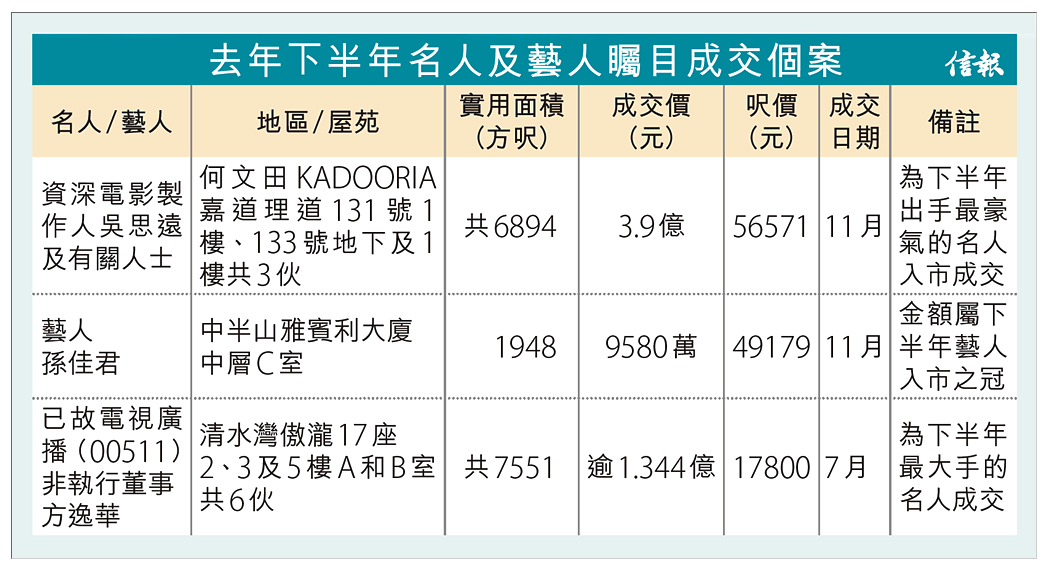名人及藝人買樓意欲高漲,出手更相當闊綽。本報統計,2017年下半年一二手住宅市場至少錄得30宗名人及藝人入市個案,涉資近19.59億元,近半屬樓價半億元或以上的豪宅成交,最豪一宗耗資3.9億元,而最貴一伙則涉資1.9億元。
2017年下半年共有30宗名人及藝人買賣成交曝光,宗數雖不及同年上半年的36宗,但當中有14宗為成交價逾5000萬元的豪宅買賣,佔期內整體名人及藝人入市個案約46.7%;金額共15.32億元,更相當期內名人及藝人買樓總金額近19.59億元約78.2%。2017年上半年36宗名人及藝人入市成交,當中17宗(約47.2%)為樓價逾5000萬元的豪宅物業,共涉資約20.86億元。
去年下半年30宗 涉資近20億
細分2017年下半年名人及藝人逾半億元成交,以資深電影製作人吳思遠及其女兒吳慧詩和女婿陳奕發出手最豪,在11月豪擲3.9億元掃入中信股份(00267)旗下中信泰富地產發展的何文田KADOORIA 3伙,單是以吳思遠個人名義購入的嘉道理道133號地下連花園單位,成交價就高達1.672億元,實用面積2400方呎,連2013方呎花園,呎價約6.97萬元,創何文田分層住宅呎價新高。
股壇猛人丁鵬雲同月斥1.49億元購中半山老牌豪宅嘉慧園D座實用面積3349方呎高層戶,該單位實用面積較2017年5月影帝張家輝以1.31億元購得的同廈J座高層單位細17方呎,連同前政務司司長唐英年堂弟唐裕年於2017年5月斥1.36億元購得的同廈J座中層戶,嘉慧園去年錄得至少3宗名人入市成交。
以單一單位成交計,期內最高成交來自資深馬主李榮翰去年11月以1.9億元購入南區大潭道20號玫瑰園雙號屋,實用面積3209方呎,呎價約5.92萬元。
藝人鍾情新盤 佔比逾八成
藝人鍾情新盤,去年下半年錄得12宗藝人入市成交,多達10宗是購買新盤單位,佔藝人買樓總數約83.3%。最豪氣為「大美人」李嘉欣斥資7620萬元購入KADOORIA嘉道理道119號5樓單位,實用面積1672方呎,呎價約4.56萬元。若連同二手住宅計,涉資最多則為藝人孫佳君,她於2017年11月豪花9580萬元買入中半山雅賓利大廈中層C室,較第二位有「COOL魔」之稱的張智霖在2017年9月購入大坑大寶閣高層A室的9180萬元,還要貴400萬元(約4.4%)。
美聯物業住宅部行政總裁布少明指出,去年下半年名人及藝人入市個案相對上半年有所減少,但數字仍屬較高水平,預期今年上半年名人及藝人入市成交保持約20至30宗,並集中大額豪宅為主。
(信報) 2018年1月23日

Weak Yen, High Prices at Home Lure Investors to Japan
Beijing and Tokyo may have territorial spats in the East China Sea, but economic ties are trumping politics. Chinese investors’ appetite for Japanese real estate is rising as the yen continues to sink.
So far this year, Chinese individuals and companies have bought almost $230 million in real estate, more than triple the amount from last year, according to data from Jones Lang LaSalle .
British luxury property developer Grosvenor Ltd., owned by the family trust of the Duke of Westminster, is betting the influx of rich Chinese investors will help boost demand for its refurbished apartments in Tokyo’s upscale Roppongi area.
“One upside scenario for Japan is its relationship with China,” said Nicholas Loup, chief executive of Grosvenor Asia. “There are huge amounts of money flows between both countries. That’s currently below people’s radar screen.”
The Japanese currency has fallen 25% against the yuan over the past five years, outstripping its 15% fall against the U.S. dollar in the same period.
Chinese tourist arrivals in Japan hit a record high this year, partly due to the weak yen, spurring investment in vacation homes. Japan has emerged as the most desired travel destination for Chinese this year, according to Travelzoo Asia Pacific. There’s also talk about making it easier for Chinese to apply for multiple-entry visas, which would further spur interest.
Rich Chinese are among the biggest foreign buyers in New York and Sydney. But other formerly popular investment destinations like Hong Kong and Singapore are becoming more costly due to taxes on nonresidents. In Hong Kong, Chinese buying is one reason real-estate prices have soared, causing social frictions with local residents.
Foreign buyers see value in Japan. On a square-foot basis, Tokyo property prices in U.S. dollar terms are about half of the levels of comparable areas in Hong Kong, and similar to prices in Beijing and Shanghai. Rental yield can be as high as 6%, compared with 3% in Hong Kong, and about 1% in Beijing.
A pickup in Japan’s real-estate market as its economy recovers, added to building for the Tokyo Olympics in 2020, is adding to the attraction;
While much of China’s investment is in retail and industrial projects, there has also been strong demand for private apartments. Since 2011, Chinese investors have bought some $84 million worth of apartments in Japan, Jones Lang LaSalle says.
Other foreign investors are piling in. Total overseas investment in Japanese real estate was 79% higher in 2013 compared with the previous year, according to commercial real-estate firm CBRE.
Some big Chinese companies also are part of the increased buying. In May, conglomerate Fosun Groupacquired Japanese property firm Idera Capital Management as a vehicle for future property investments. Fosun in August acquired a 25-story office building in Tokyo that formerly was Citibank’s Japan headquarters and has further plans to develop real estate.
That’s not to say political tensions aren’t there. In 2012, anti-Japanese protesters attacked Japanese businesses in China.

